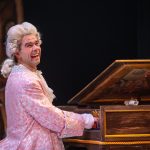At home with the Prometheus Trio
Prometheus Trio concerts, at the intimate little concert hall of the Wisconsin Conservatory of Music, have become endearingly homey.
Monday night, for example, pianist Stephanie Jacob sensed that someone late for the second half was stuck outside curtained glass door, the only entrance. She jumped up from the piano, opened the door, and ushered the embarrassed young fellow in. Before the intermission, upon completion of Martinu’s Cinq pièces brèves (1930), Jacob shocked her husband, cellist Scott Tisdel, and violinist Timothy Klabunde by saying: “I just have to play that last one again. I just have to.” To which the incredulous Tisdel exclaimed: “She’s nuts!” Then they played it again, much to the amusement of the audience.
All this could be annoying, but isn’t. The audience and performers know one another so well that everyone’s in it together. And Jacob is so utterly ingenuous that you have to love her. The Prometheans play chamber music of the virtuoso variety, but it’s still chamber music. You could play it in your living room. More and more, that’s how these concerts feel. I like it.
Of course, none of that would matter if they didn’t play well and put together interesting programs. Jacob, Klabunde and Tisdel do both. They have taken on the underrated Martinu as a special cause play him often. Monday they made a strong case for the Cing pièces brèves, a set of boisterous miniatures. Martinu couched his dense and nearly relentless counterpoint in raucously extended tonal harmony. Fierce syncopations yank the themes this way and that through the four fast movements, especially the finale, which sounds like a jazz band rehearsing on a bus as it careens down a pot-holed mountain road. No wonder Jacob wanted to play it twice.
This especially venturesome program also included the single-movement Trio élégiaque, from Rachmaninoff’s student days, and Anne Dudley’s trio setting of the Chaconne from Bach’s Partita No. 11 for solo violin. They added an arrangement of Brahms’ Hungarian Dance in D minor as an encore.
Rachmaninoff’s big, Romantic melodies sweep through a sprawling sonata form. The Prometheans phrased this juicy music generously, lavished rich, warm sound upon it, and got behind that certain sense of waves forming, building, cresting and crashing that is essential to this sort of Romantic music. (It don’t mean a thing if it ain’t got that… surge.)
In its pure form for solo violin, Bach’s Chaconne is a lonely act of heroism, an attempt to wring multiple ongoing voices out of an instrument not really made for it. Much of the music is implicit or suggested. It is gripping in its austere, severe, even skeletal essence.
Dudley, with three instruments at hand, fully and expertly realized Bach’s every suggestion. She put flesh on the bones, and the bones bear the weight well.
This program will be repeated in a matinee at 11 a.m. Tuesday, Dec. 77 at the conservatory, 1584 N. Prospect Ave. Call 414-276-5760 for ticket information.























The Mozart was fabulously pastel, a weightless petit rien
at the beginning and becomming increasingly Limoges near the end.
The Martinu came to us as a demonstration of itself and therefore
was worked free of what may have originally been an evil desire
by the composer to confuse both listener and performers.
The Trio Elegiac was free of Rachmaninoff’s trademark mimosa effect
evidently due to a reconsideration by the players as to rationing the load on the many climaxes within it and therefore rescuing it from
an evident structural flaw.
The Bach Chaconne was given an entirely new angle, and that was to
not have angles anywhere. The instrumental variety proposed and, by means of opportunities taken, fulfilled an interesting radicalism to the extent that where Bach would be confidently joyous and ever worshipful, he was instead made to cringe and weaken like a man disrobed who can think no further than his nakedness.
Thanks, Tom!!! Always great to have you there–
Stefanie
(with an F!!!)
Tom, I, too, enjoyed the rich variety of works that Stefanie, Tim, and Scott performed on Monday night. Don’t you think that Stefanie set an interesting precedent by repeating a movement of the Martinu piece? Perhaps they will start letting audience members request a repetition or two. I considered calling out for encores of the 2nd and 3rd movements as well, as they were so piquantly beautiful.
The Prometheus Trio is another example of the incredible array of artistic excellence in Milwaukee. We are so lucky to have them.
The Mozart was a sweet Christmas truffle, but the Rachmaninoff was too syrupy for my taste.
“Do overs” should be honored more often when a work is new. Hearing the dramatic last section of the Martinu a second time helped the audience appreciate the talent, the madness and the layers in the piece. I like the image of a bus. Stephanie drove it even faster the second time down the mountain. At that speed, the underlying jazz synchopation became more obvious.
I tend to like Bach in pure form. But the Youtube link to a Nathan Milstein performance demonstrates how stark the chaconne can be for solo violin. While at Youtube check out the performance by Itzhak Perlman. He plays in a richer acoustical environment and adds a romantic touch to the variations that Milstein avoids. As a trio, the work is transformed. The variations offer more contrast. The work is more easily accessible with the broader palette.
Four comments, on a concert that drew an audience of maybe 90. Come on, you other 86 — let’s hear from you!
Seriously, thanks for the astute comments. I would love to see our reviews become jumping-off points for discussion. — Strini
Tuesday’s (literal) matinée was equally good. I, too, am suspicious
of later reworkings of compositions but found that each of the variations in the Bach provided a window on a little world of its own.
If Samuil Feinberg was still around he’d listen to the Prometheus’ version of the Bach Chaconne and stroke his goatee so as to look thoughtful and hide a smile.
Timbre joins transposition as a potent mood altering wrench,
while for our greater good the strength of Bach’s design resides in the rests and in those Franck-like places where there is an absence of theme.
I love the Prometheus Trio! On this particular night, my favorites were the two inner works, the Martinu and the Rach. Absolutely delicious.
And the fact that it feels a bit like being in one’s own living room (I wish!) makes it just that much better.
Even being able to sip coffee while listening is lovely. But the MUSIC! Oh, yes!